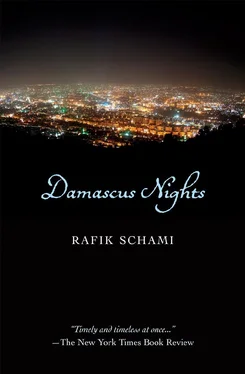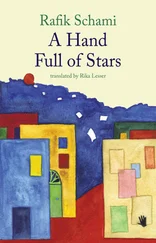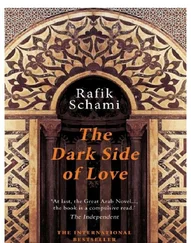When Salim reached the spice market, he took a short rest in a tiny cafe. The tables were just large enough for a cup of coffee, a glass of water, and an ashtray — nothing more. The only person seated inside was a man with gray hair and a stubbly beard who seemed to be a friend of the owner. The private conversation died down as soon as Salim walked in. The old coachman was just able to catch the word
Mazzah —the prison for "politicals." "It's colder today than it was yesterday," the proprietor repeated from time to time and thoughtfully ran his fingers over the amber beads of his rosary.
Salim drank his coffee slowly and looked through the steamed-up windows at the people hurrying by on their way to the market. An old horse stopped in front of the cafe. Despite the cold the horse was dripping with sweat and panting loudly as it tugged away at the heavy cart: a wheel was stuck in a deep pothole. The young driver cursed and whipped the horse without mercy. Salim tensed up and shook his head, and not until some passersby helped pull the cart, heavily loaded with bulging sacks, out of the pothole did the old coachman feel relieved.
When Salim left the cafe, he was enveloped in an aromatic cloud that came wafting from the spice market. Star anise, cardamom, and coriander were crassly celebrating their triumph over all the other spices, though thyme from the Syrian mountains kept chiming in as well with its deep voice and a stubbornness impossible to ignore. Now and then cinnamon would whisper sweetly and seductively, when the master spices weren't paying attention. Only the saffron blossoms kept silent, preferring to rely solely on their radiant yellow to entice prospective buyers.
Lies and spices are siblings. A lie can change even the blandest occurrence into a piquant dish. The truth and nothing but the truth is something only a judge wants to hear. But just like spices, lies should be used solely to add a little flavor. "Not too little, not too much," thought Salim, "that's how they're best savored." He paused for a moment at the entrance to the bathhouse and looked over at the shops whose shelves were filled to the brim with spices.
It had been years since Salim had taken a steam bath. He bathed every Saturday in his kitchen using an ancient tin basin. He had just, managed to take a couple of steps inside when he was jostled by a young man wearing nothing but a towel. The man gave a shriek — he was running from another man who was hot on his heels with a bucket of icy water. The place was crowded with soldiers; they had occupied all the benches in the tearoom. Salim recognized them by their short hair. The room reeked of sweat, and that repulsed the old coachman. It seemed the men had never been to the baths before; they were making as much noise as they would at a fairground. Gone was the peace and quiet so treasured by every connoisseur of the steam bath. Salim could hear them shouting for hand towels. He had never heard such a thing in all his years, for the attendants always provided more than enough towels for their guests the moment they began undressing. "They must be enlisted men or very young officers," he thought, and hurried out, just as the two young men who had raced past a moment before started wrestling on the ground in front of the fountain, to the great amusement and applause of their comrades.
Salim suddenly felt hungry. Not far from the bath two vendors were selling kebabs, grilled innards, boiled tongue, and roasted liver. They were hawking their wares loudly and aggressively. "Walk up and have a taste before I sell out!" shouted one. "You don't need a single tooth to eat mine!" countered the other, "the meat's so tender it'll melt on your tongue!" Many passersby let themselves be tempted— the spice market had already set their mouths to watering. Salim listened to the loud offers and decided on the man who was loudly proclaiming his generous use of fresh parsley. Since Salim wanted to pamper himself he purchased three kebab sticks for one lira. But he was only able to enjoy one. Not because the vendor had been exaggerating: no, the fresh parsley really did make the kebab taste delicious. But then, on top of a table inside the shop, he saw two boiled sheep heads. The one on the right was munching a bunch of parsley; his tongue was hanging from his mouth at a particularly odd angle. The other one was grinning right at Salim, showing off his mighty maw. Clutching his kebabs, Salim turned and looked down at the ground, but there he saw a third mutton head beneath the butcher's block, in the middle of the offal. It had yet to be boiled and was gazing up at Salim with large, reproachful eyes and a dangling tongue. Salim wrapped the two kebabs in some pita bread and hurried away; he felt an unbearable, burning pressure in his stomach. He waited for the fresh air to cool off his head. Salim hunkered down in front of a spice shop and hastily devoured the kebabs with the bread. But they no longer tasted very good.
After his meal he made his way through the goldsmiths' market to the Umayyad Mosque.
A remarkable calm emanated from the great hall of the mosque. The people walked noiselessly across the floor covered with heavy Persian rugs, lost in thought or engrossed in silent prayer. Or else they sat in a group around a learned elder, talking. Others were sleeping or staring intently at a point in the high dome, at an ornament hanging on the wall or from the ceiling.
Salim's legs were sore, and the fatty meat made his stomach heavy. He stretched out on a rug and wondered why he had recently felt this emptiness inside his head. Never in his life had he had such difficulty thinking his thoughts through as in the last months. They were becoming more and more blurred — probably because he was no longer able to speak with anyone. So the tongue, he reasoned, is like a potters hands, which give the clay such beautiful and useful form. Salim smiled at the droll insight that he could think clearly only if he talked. And just as that thought was taking shape, he saw his wife coming around the corner. He rubbed his eyes in amazement. Zaida was walking toward him wearing a blue velvet dress and smiling. Her delicate fingers had the red tint of henna. Her hair was gray, but it had a reddish cast. She laughed when she saw him. "What are you doing here, my Salim, little tassel of my heart? Why are you sleeping here?"
"My legs were a little tired. I'm not as young as I used to be, you know. In the old days I used to make it from our street to the mosque in an hour; today it took me three times as long."
"You've just become a tortoise, my Salim, and like a tortoise you're going to live to be a hundred. Didn't I tell you? Once, when you were very sick, the angel of death came to me. 'Well, old woman,' said the cutter of all souls, 'I'll be coming for him soon, and you'll be looking for someone else.' But I haggled with him until he finally took ten years from my life and gave them to you. He called me a crazy woman and hurried to Abdullah the goldsmith. Didn't I tell you the very next morning, how Abdullah had died in the night? You just laughed at me. 'Abdullah? You're crazy, the angel of death won't get far with him. That man has seven souls, just like a cat.' Isn't that what you said? And then what happened? Abdullah lay dead in his bed. His widow's still alive and doing well. The reason so many wives outlive their husbands is because they aren't so foolish as to take life as seriously as their spouses. But I wanted to die first. I was always bored when you were away, and I couldn't stand being bored. That's all. Don't look at me so horrified. I know, I know, not a second went by when you weren't head over heels in love with me. I, on the other hand, found life with you to be very stressful, but never boring. Isn't that love enough? What a beautiful tray."
Читать дальше












